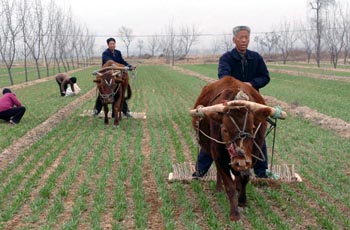| Tools: Save | Print | E-mail | Most Read |
| China Questions and Answers |
| Adjust font size: |
Q: To build a harmonious and well-off society is an ideal that humankind has always pursued. Is it too early, however, for China, a country with a serious wealth gap and significant urban-rural disparity, to propose and strive for the concept of a "harmonious society?" What is the government's overall goal, and how will the government help people realize it? A: International experiences show there are two possible outcomes for a low-income country striving to become a medium-income country, or to increase the per-capita GDP from US$1,000 to US$3,000. One is that the country will move into a "golden developing period," maintaining economic growth for a comparatively long period of time and smoothly realizing industrialization and modernization. The other potential outcome is that the country will move into a "period of acute conflicts," when the incompatibility between economic and social development exposes all kinds of economic and social contradictions, which, if not handled well, will intensify. This could retard development and even trigger social uneasiness and recession. China began this transition in 2003 when its per-capita GDP reached the threshold of $1,000. As China is now in the process of system transition, restructuring and reform, the country has created the greatest economic miracle humankind has ever seen, with two decades of economic growth as high as 9 percent. But the price for this rapid growth is growing social disharmony, with unfair income distribution, a wealth gap, unemployment and corruption as the key complaints. Under such circumstances, to build a harmonious society is crucial to realize a smooth transition, and achieve prosperity for all Chinese people. The "socialist harmonious society" that China is going to build is defined as a stable and orderly society embracing democracy, the rule of law, equality, justice, sincerity, amity and vitality, where humans and nature are in harmony. The overall goals include to expand the middle class, reduce the number of low-income and impoverished people, make incomes more equitable, crack down on corruption and illegal income, strengthen transfer payments, focus on expanding employment, strive to improve social and labor relations, and handle with due prudence all kinds of emerging social conflicts in accordance with the new conditions, so as to build a well-off society where there is happiness, justice, harmony, thriftiness and vitality. It has been an ideal for humankind as well as for the Communist Party of China to realize social harmony and build a well-off society. China pledges to build a harmonious society in two decades as the concept aligns with the interests of its 1.3 billion people.
|
| Tools: Save | Print | E-mail | Most Read |
 |
| Related Stories |
|
Product Directory China Search |
Country Search Hot Buys |
